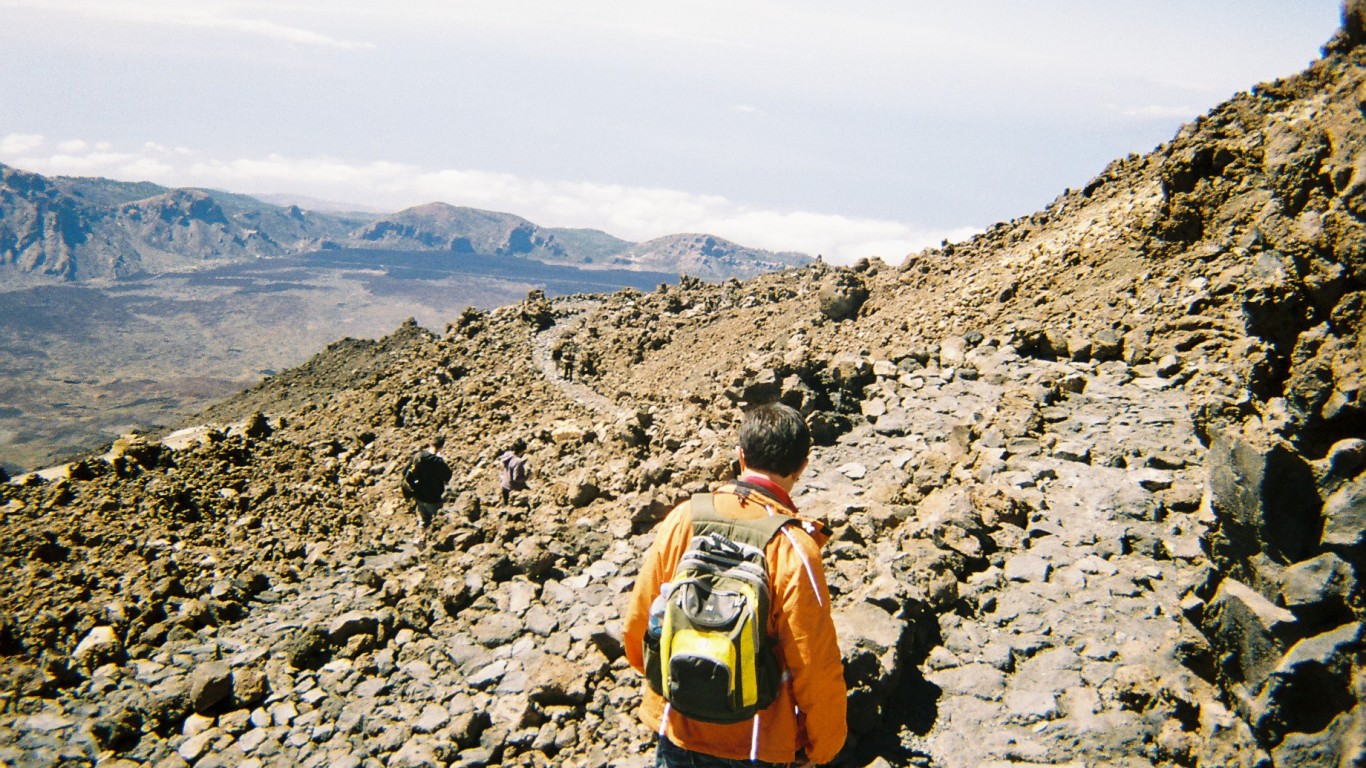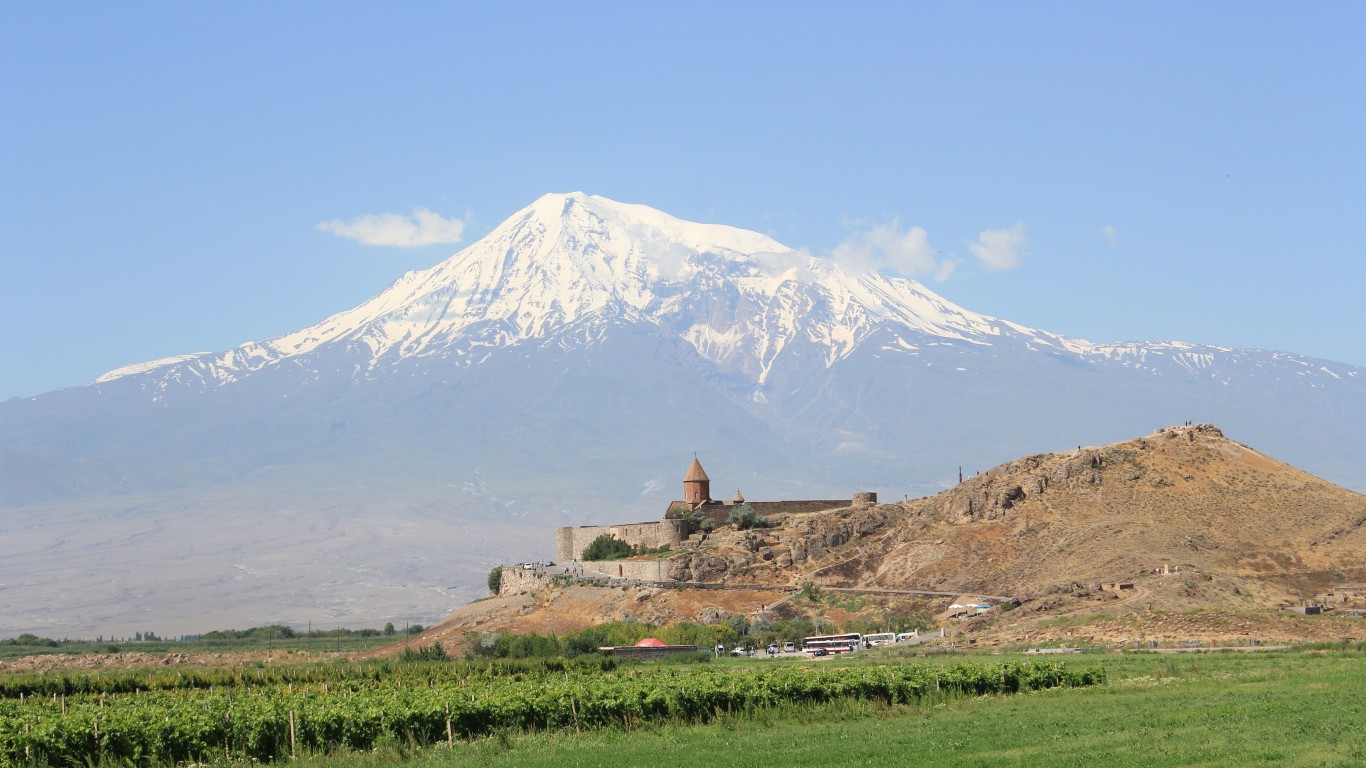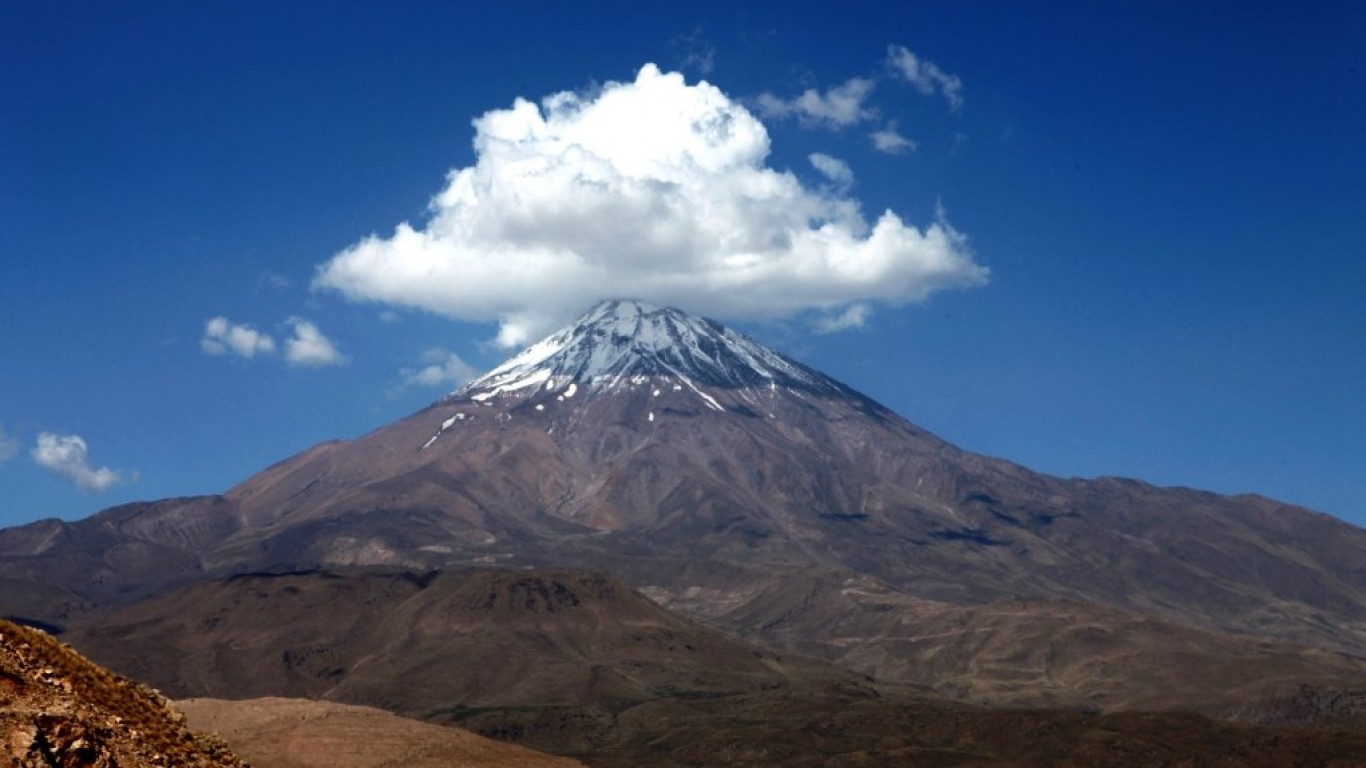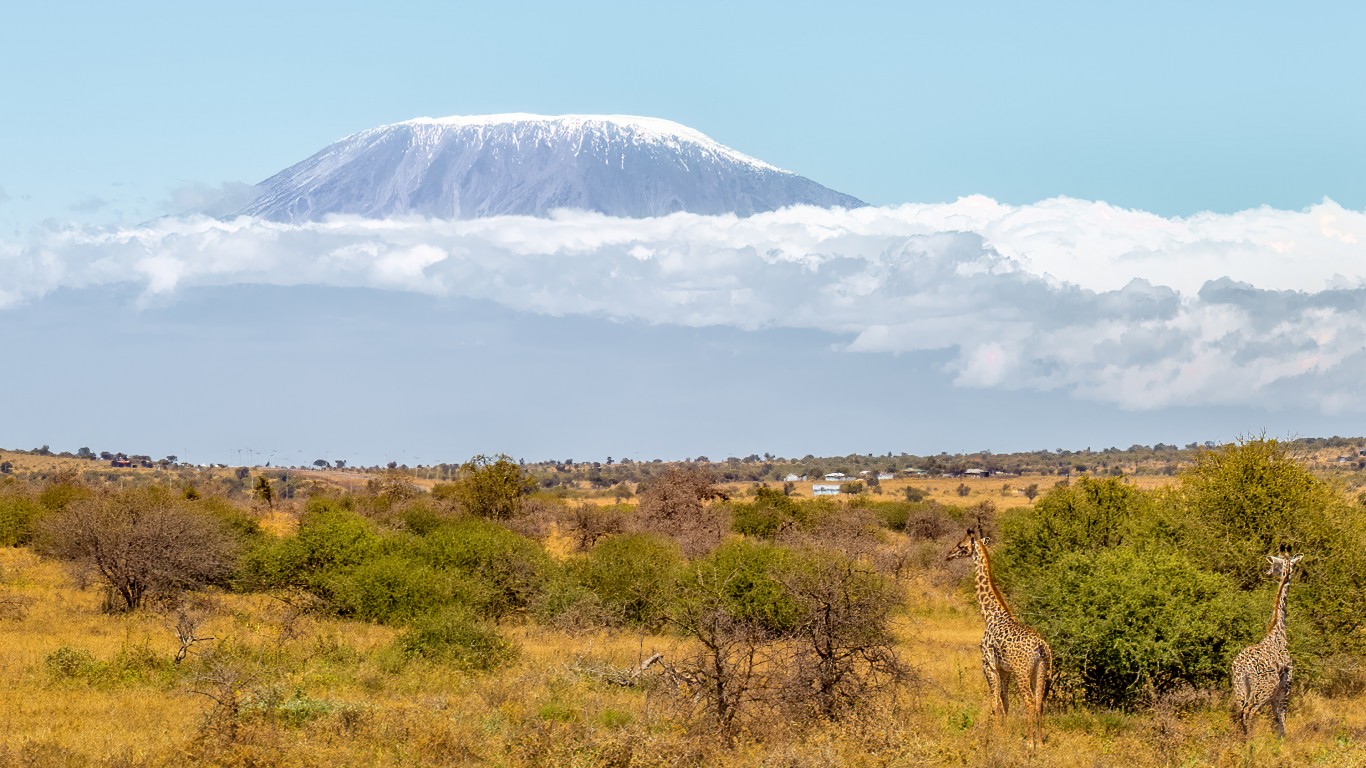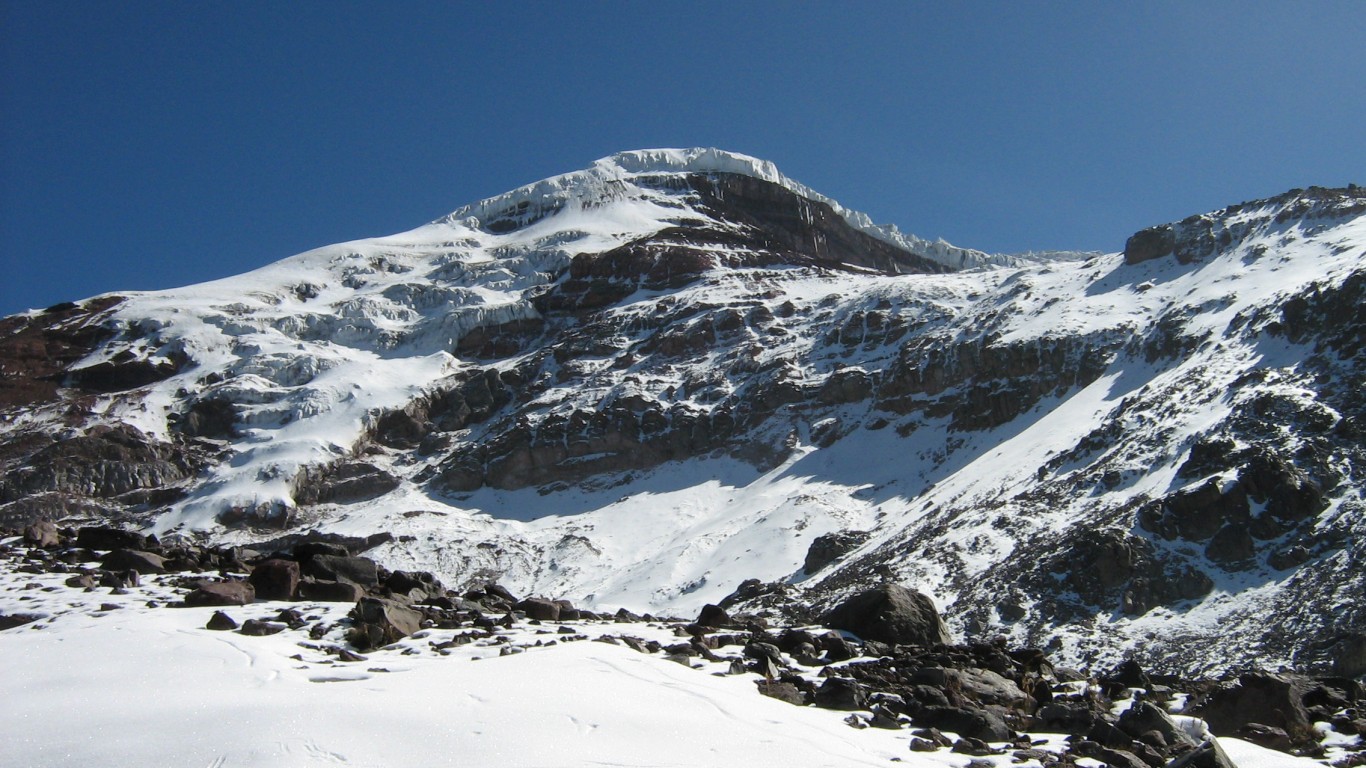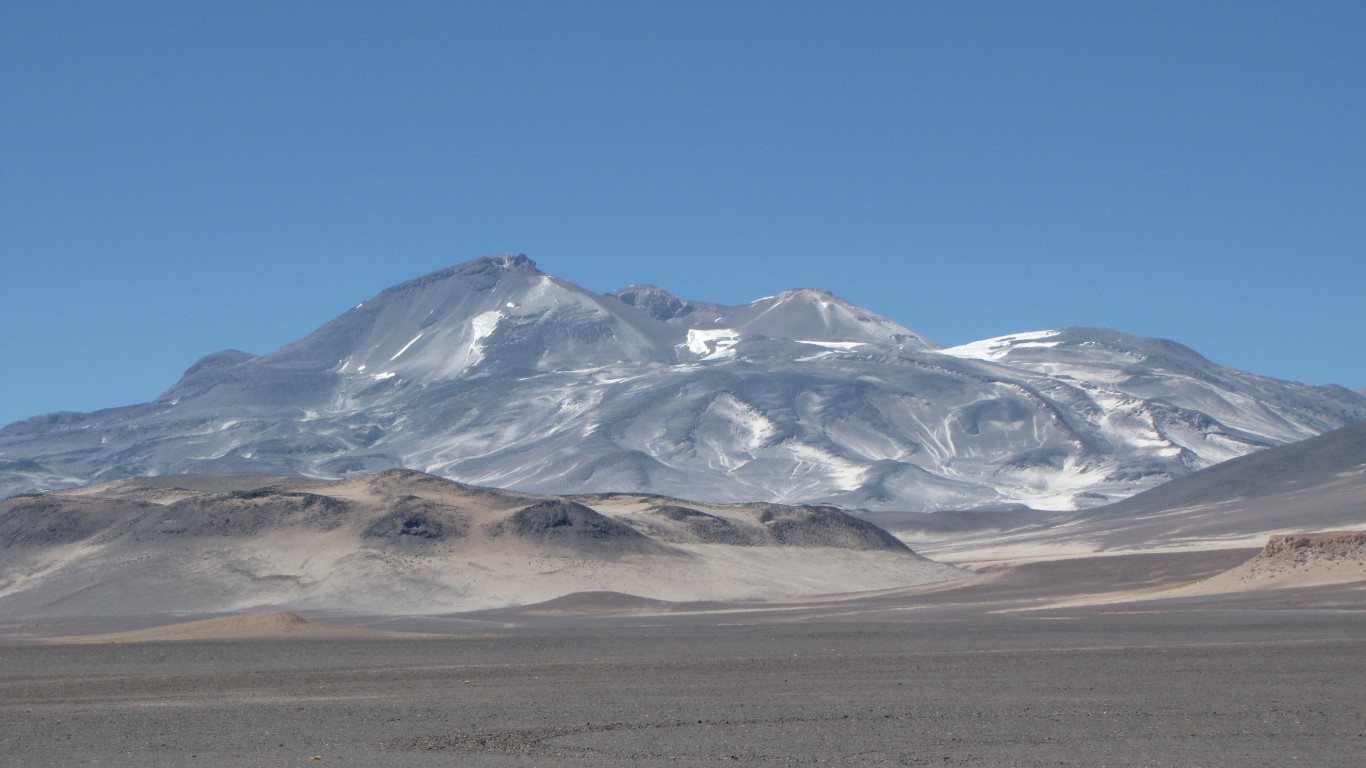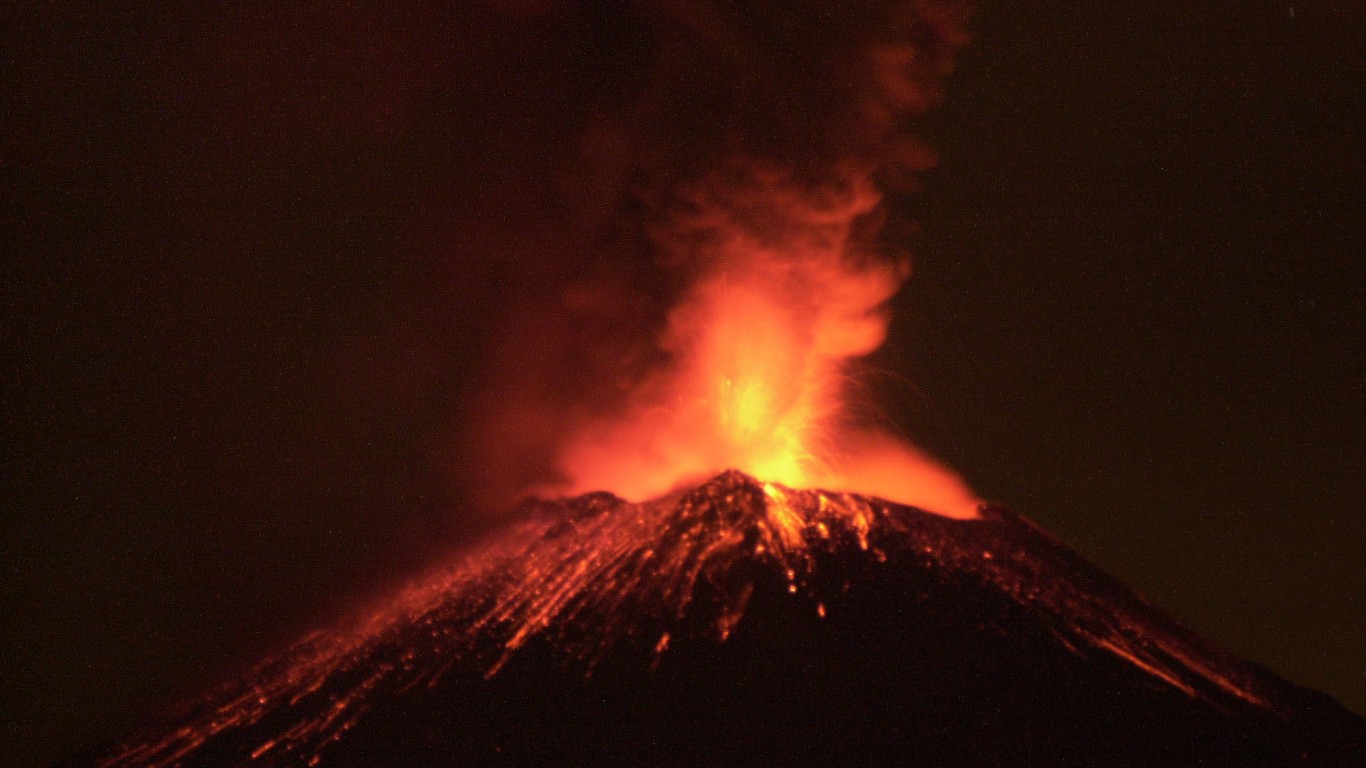
Mauna Loa, on the Big Island of Hawaii – the largest active volcano on earth – recently erupted for the first time in nearly 40 years. The volcano had been showing signs of activity since September. Luckily, the location of the lava flow currently poses no threat to nearby communities. (Not all eruptions are so innocuous. Here are the most devastating volcanic eruptions in history.)
Although Mauna Loa measures 30,085 feet from its underwater base, only 13,680 feet of this massive mountain rise above sea level. This means that despite its size, its summit is nowhere near as high as the tallest volcanoes on earth when measured from sea level. For example, Mauna Loa’s peak is nearly 9,000 feet lower than that of the Andean mountain Ojos del Salado, which is the tallest volcano on earth when measured from sea level.
To compile a selection of 13 of the tallest volcanoes on the planet, 24/7 Tempo reviewed a list created by Statista, a consumer data site, and ESRI, a geographic information system software company, as well as information from Geology.com and the United States Geological Survey. The list is representative, not exhaustive. Heights are measurements above sea level.
Click here to see 13 of the tallest volcanoes in the world
There are 20 volcanoes on earth with summits that exceed 20,000 feet, all in the Andes. Created around 50 million years ago by a collision of two tectonic plates, this emblematic South American mountain range is known for its dramatic peaks and volcanic activity. The only mountains higher than the Andes are the Himalayas, which lack volcanic activity. (Here are the tallest mountains in the world.)
While the tallest volcanoes are all in the Andes, there are volcanoes over 10,000 feet high on every continent, whether they are active, dormant (potentially active), or extinct. While the tallest volcanoes in the United States are in the Hawaiian islands, there are also volcanoes in Alaska and the continental U.S., some still active. Here are the most dangerous volcanoes in the United States.
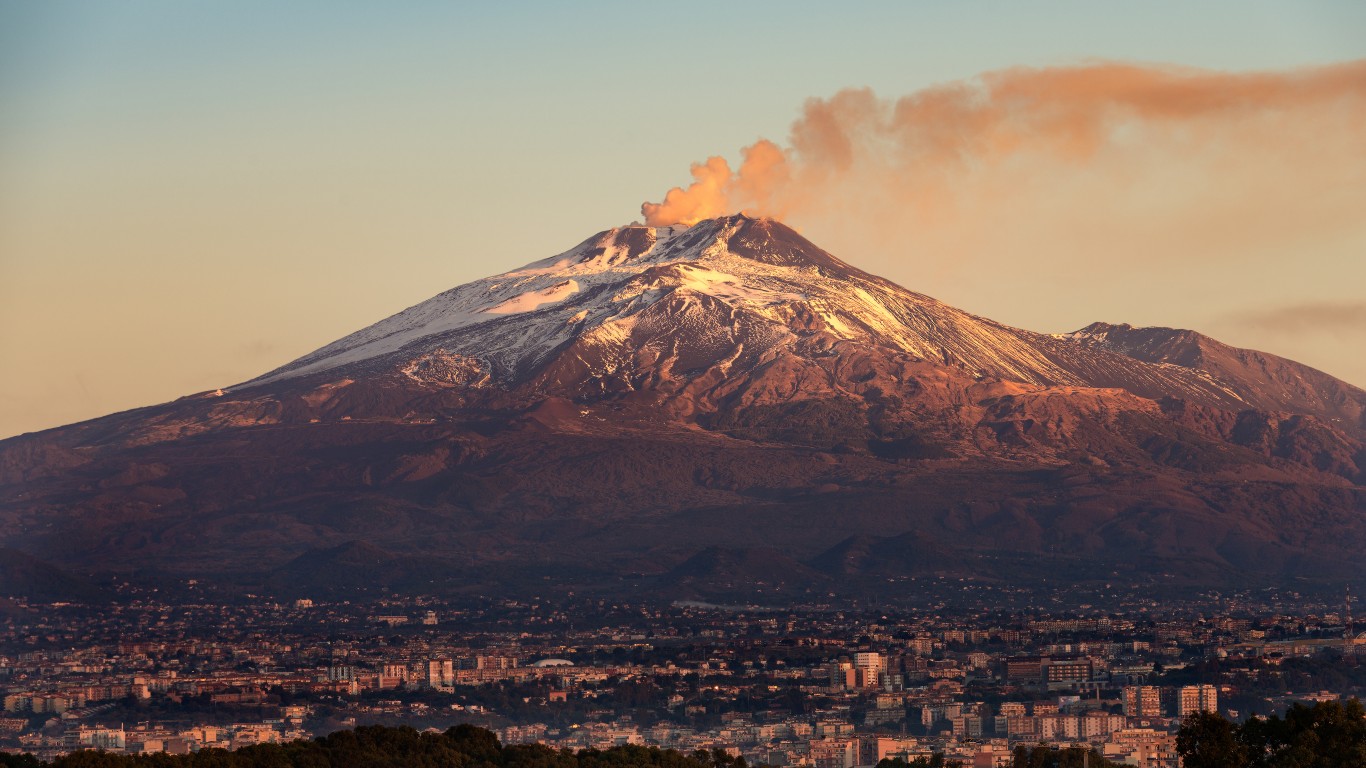
Mount Etna
> Location: Catania (Sicily), Italy
> Height above sea level: 11,013 feet (3,357 meters)
> Status: Active
Located on the island of Sicily, Mount Etna is the highest volcano in Western Europe and one of the most active volcanoes in the world. It has likely been active for the last 2.6 million years and is frequently seen emitting a plume of smoke.
[in-text-ad]
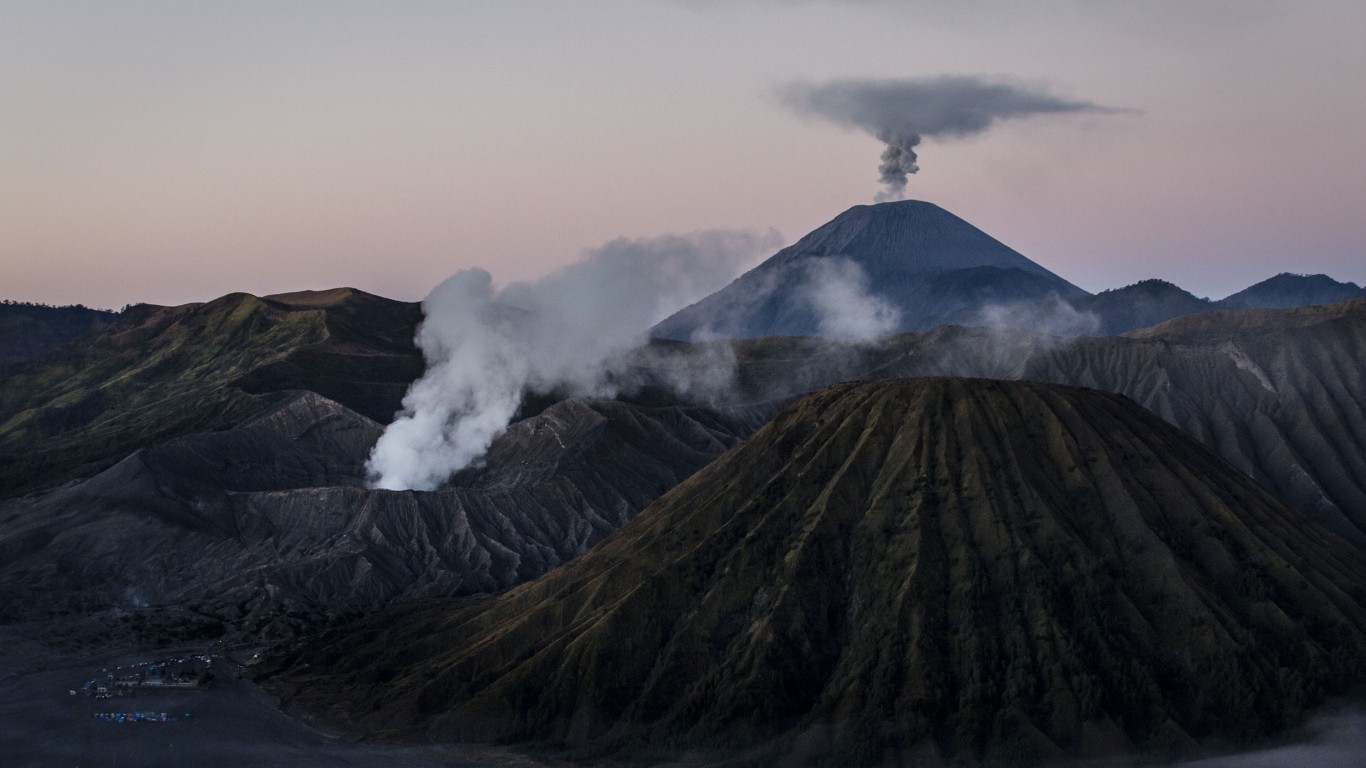
Mount Semeru
> Location: East Java, Indonesia
> Height above sea level: 12,060 feet (3,676 meters)
> Status: Active
Mount Semeru, which is extremely active, is the highest volcano on the Indonesian island of Java. It has been in near constant eruption since 1967, with the last major episode, on December 4, 2021, destroying more than 5,000 homes and killing at least 69.
Mount Teide
> Location: Tenerife (Canary Islands), Spain
> Height above sea level: 12,188 feet (3,715 meters)
> Status: Active
Located on the most populous of the Canary Islands – a Spanish archipelago off the coast of northwestern Africa – Mount Teide is the third largest volcano in the world when measured from base to summit, with a total height of 24,600 feet.
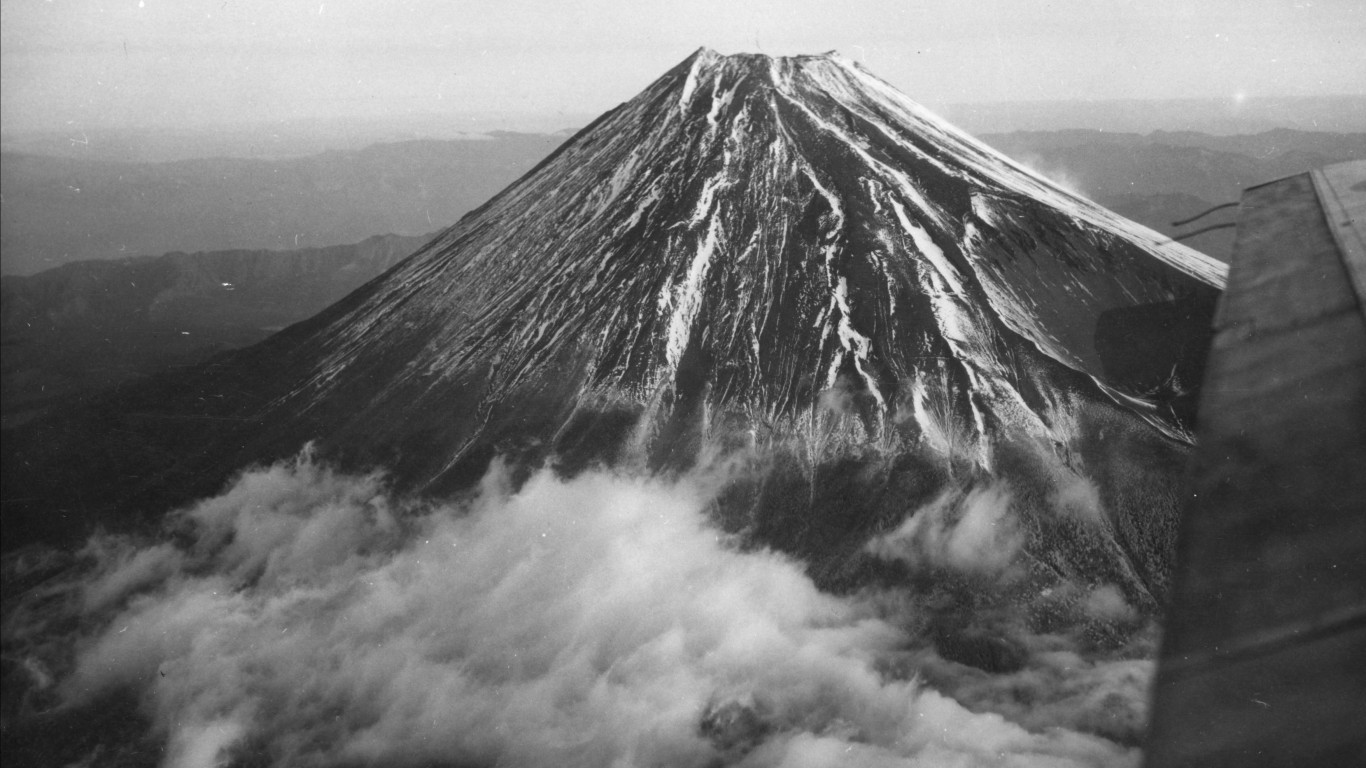
Mount Fuji
> Location: Honshu, Japan
> Height above sea level: 12,388 feet (3,776 meters)
> Status: Active
This iconic volcano is the highest mountain in Japan. Although considered active by geologists, it has been dormant since 1707, when it last erupted. The present mountain is actually a composite of three older volcanoes.
[in-text-ad-2]
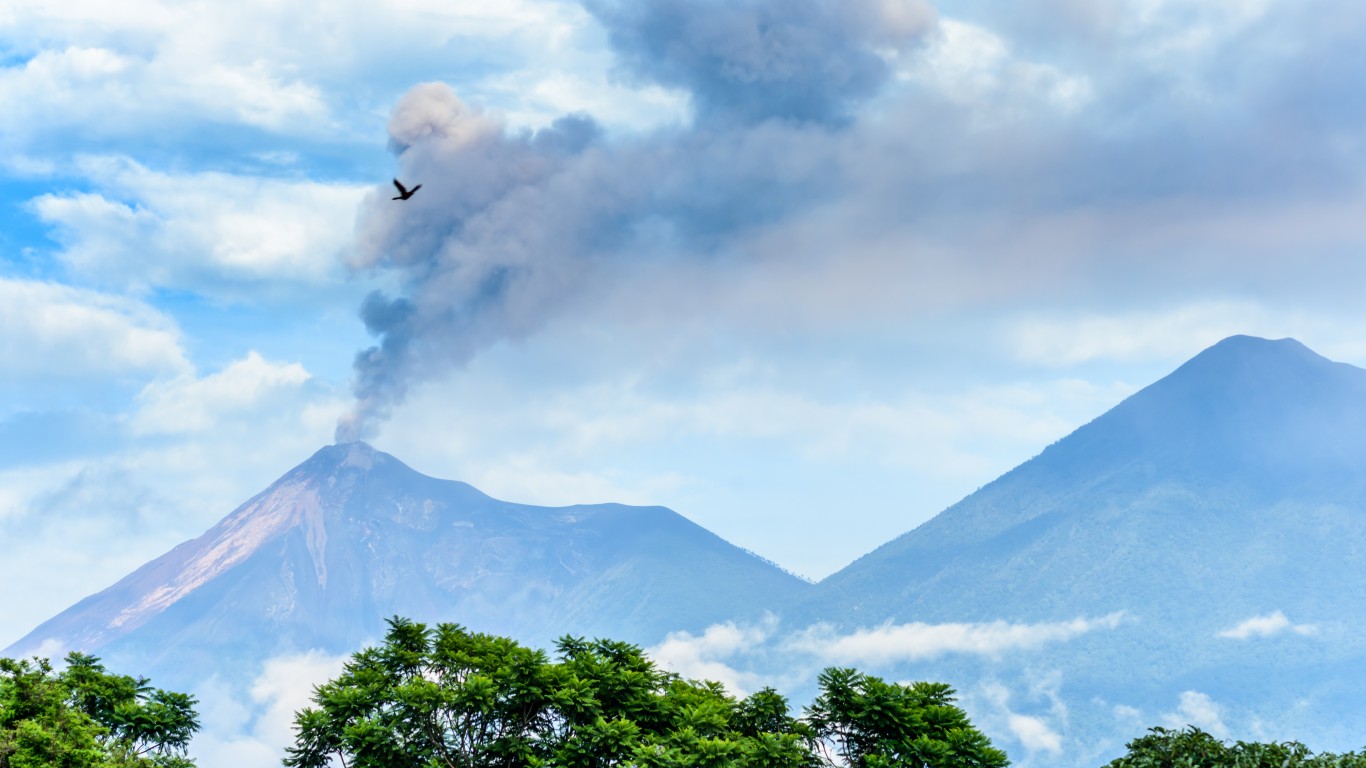
Acatenango Volcano
> Location: Antigua, Guatemala
> Height above sea level: 13,045 (3,976 meters)
> Status: Active
This double-summit volcano overlooking Antigua had its last major eruption in 1972, but is a popular tourist destination with a difficult and steep hike that affords the adventurous excellent views of the nearby active Fuego Volcano, known for its nearly constant spewing of ash and smoke.
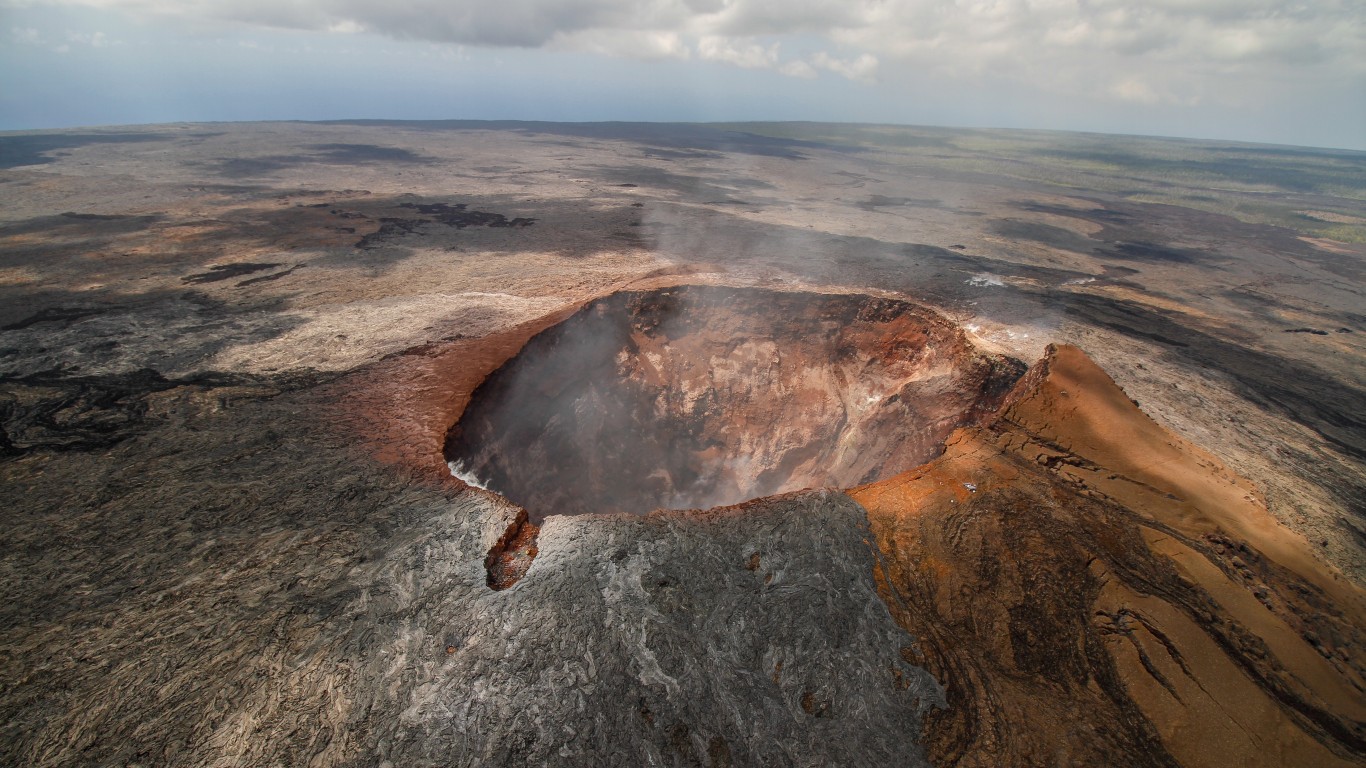
Mauna Loa
> Location: Big Island (Hawaii), United States
> Height above sea level: 13,679 feet (4,169 meters)
> Status: Active
From base to summit, Mauna Loa measures 30,085 feet, making it the second highest mountain on earth after its neighbor Mauna Kea, which is 33,500 feet from its base under the ocean. (Mount Everest rises to 29,032 feet.) It is considered the largest active volcano in the world when measured from its base rather than height above sea level.
[in-text-ad]
Mount Ararat
> Location: Provinces of Iğdır and Ağrı, Turkey
> Height above sea level: 16,854 feet (5,137 meters)
> Status: Dormant
The highest mountain in Turkey, Mount Ararat has two snow-capped cones. Its last eruption in 1840 was accompanied by a magnitude 7.4 earthquake and caused massive landslides and lahars (debris flows) that destroyed settlements and claimed the lives of more than 10,000 people. Ararat is traditionally identified as the resting place for Noah’s Ark after the great biblical flood.

Popocatépetl
> Location: States of Puebla, Morelos, and Mexico in Mexico
> Height above sea level: 17,802 feet (5,426 meters)
> Status: Active
Popocatépetl is the second highest volcano in Mexico, as well as one of the most active volcanoes in the country. Its name means “smoking mountain” in Nahuatl, and it has been consistently emitting smoke since 1991.
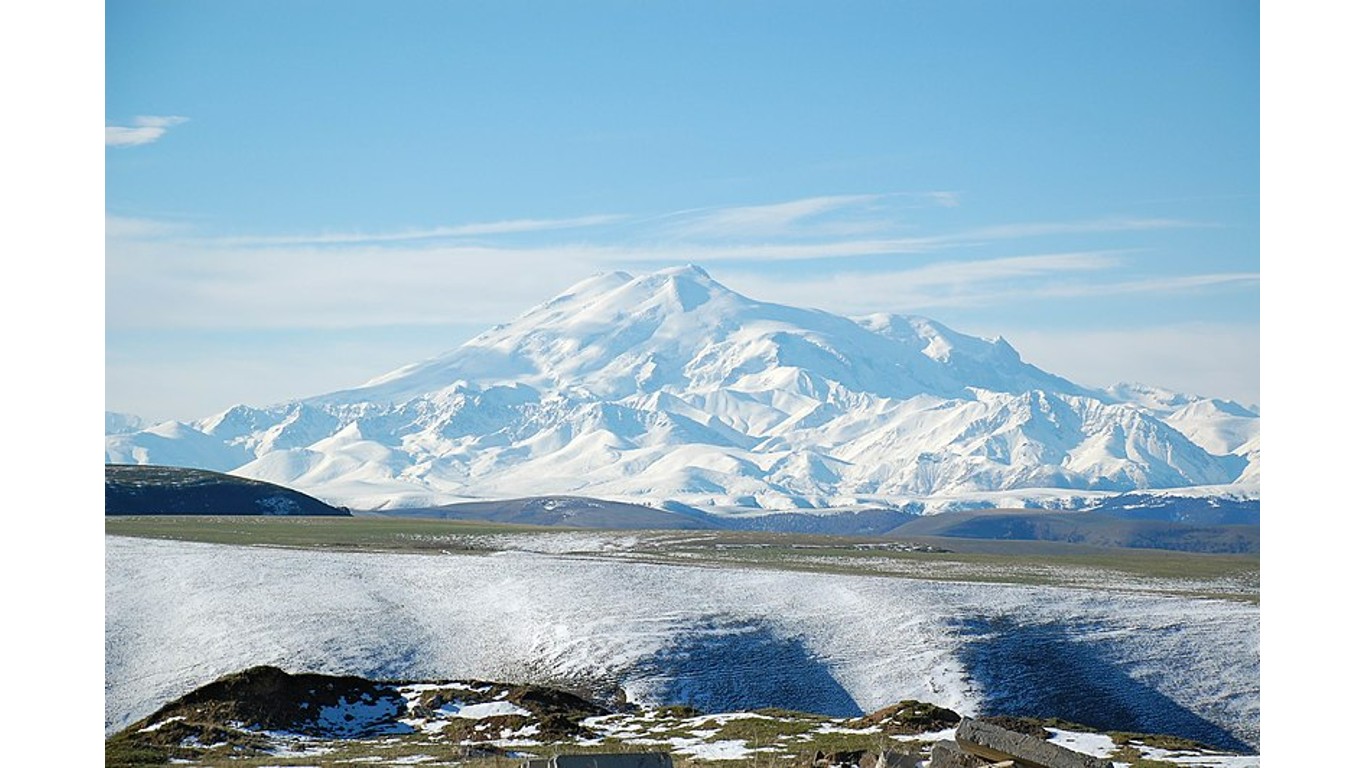
Mount Elbrus
> Location: Republics of Kabardino-Balkaria and Karachay-Cherkessia, Russia
> Height above sea level: 18,510 feet (5,642 meters)
> Status: Dormant
Mount Elbrus, in the Western Caucuses, is the highest peak in Russia and consists of two volcanic domes. While its last eruption took place around the year 50, current volcanic activity on the mountain includes fumaroles (steam vents) and geothermal springs.
[in-text-ad-2]
Mount Damavand
> Location: Amol, Iran
> Height above sea level: 18,606 feet (5,671 meters)
> Status: Dormant
The snow-covered peak of Mount Damavand is the highest volcano in Asia. Its last eruption was around 5300 BC, but the volcano is sometimes considered potentially active because of the sulfur fumaroles near the summit crater.
Kilimanjaro
> Location: Tanzania
> Height above sea level: 19,341 feet (5,895 meters)
> Status: Dormant
In addition to being the highest mountain in Africa, Kilimanjaro is also the tallest free-standing mountain in the world. Its last major eruption was 360,000 years ago and its last activity was 200,000 years ago.
[in-text-ad]
Chimborazo
> Location: Ecuador
> Height above sea level: 20,561 feet (6,267 meters)
> Status: Dormant
Because of Chimborazo’s location on the Earth’s equatorial bulge, this volcano is the furthest peak from the center of the earth, and the closest point to outer space on the planet. Its last eruption came around the year 550. The snow-capped peak is a popular mountaineering destination.
Ojos del Salado
> Location: Argentina and Chile
> Height above sea level: 22,615 feet (6,893 meters)
> Status: Active
Ojos del Salado is not only the second-highest mountain in the Andes (after Aconcagua in Argentina), but the highest volcano on earth, when measured from sea level to the summit. Despite its height, dry conditions prevent the formation of a permanent snow cap.
100 Million Americans Are Missing This Crucial Retirement Tool
The thought of burdening your family with a financial disaster is most Americans’ nightmare. However, recent studies show that over 100 million Americans still don’t have proper life insurance in the event they pass away.
Life insurance can bring peace of mind – ensuring your loved ones are safeguarded against unforeseen expenses and debts. With premiums often lower than expected and a variety of plans tailored to different life stages and health conditions, securing a policy is more accessible than ever.
A quick, no-obligation quote can provide valuable insight into what’s available and what might best suit your family’s needs. Life insurance is a simple step you can take today to help secure peace of mind for your loved ones tomorrow.
Click here to learn how to get a quote in just a few minutes.
Thank you for reading! Have some feedback for us?
Contact the 24/7 Wall St. editorial team.
